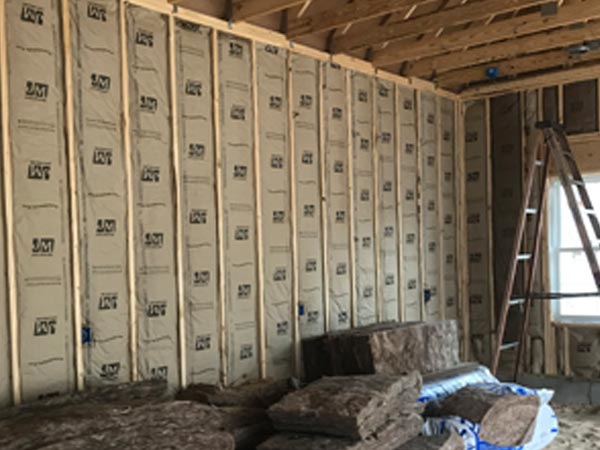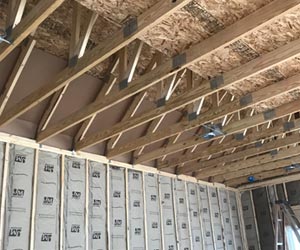As a Michigan homeowner or builder, you know the importance of proper insulation. Keeping your home well-insulated is crucial for staying comfortable year-round, whether you’re battling the harsh winter cold or the humid summer heat. The right home insulation can make a significant difference in your heating and cooling costs, helping you or future homeowners save money while maintaining a cozy, energy efficient living space.
When it comes to insulation options, two of the most popular choices are fiberglass and cellulose. Both materials have their own unique benefits and considerations, so let’s dive in and explore the differences.
Understanding Insulation Basics
At the heart of any effective insulation is the R-value – a measure of the material’s resistance to heat flow. The higher the R-value, the better the insulating properties. Fiberglass and cellulose insulation come in various forms, including batt (or blanket) insulation and loose-fill (or blown-in) insulation. These types of insulation can be used in different areas of your home, such as the attic, basement, each wall cavity, floors, and even nook and cranny spaces.
Fiberglass Insulation
 Fiberglass insulation is a widely available and relatively easy-to-install option, especially in the case of batt insulation. Made from molten glass, it offers good moisture resistance and is non-combustible, making it a fire-retardant choice.
Fiberglass insulation is a widely available and relatively easy-to-install option, especially in the case of batt insulation. Made from molten glass, it offers good moisture resistance and is non-combustible, making it a fire-retardant choice.
However, fiberglass has a lower R-value per inch compared to cellulose, and the installation process can be irritating to the skin and lungs if proper safety gear is not used. Over time, fiberglass insulation may also settle, reducing its overall effectiveness.
Cellulose Insulation
On the other hand, cellulose insulation boasts a higher R-value per inch, making it a more efficient insulation material. It’s made from recycled materials, often recycled newspaper, giving it an eco-friendly edge. Cellulose also has excellent sound-dampening properties and can effectively fill wall cavities, helping to reduce air leaks.
But it’s important to note that cellulose can be more expensive than fiberglass and requires professional installation for blown-in cellulose applications. It’s also susceptible to moisture damage if not properly installed and may settle over time, affecting its effectiveness.
Factors to Consider
 When choosing between fiberglass vs cellulose insulation, consider factors such as your home’s construction, the environmental impact, and the ease of installation. Fiberglass batts may be a better DIY option, while blown-in cellulose typically requires professional expertise. Although, when installing insulation, whether fiberglass or cellulose, it’s highly recommended that the job be done by a professional to ensure proper installation, safety, and maximum effectiveness.
When choosing between fiberglass vs cellulose insulation, consider factors such as your home’s construction, the environmental impact, and the ease of installation. Fiberglass batts may be a better DIY option, while blown-in cellulose typically requires professional expertise. Although, when installing insulation, whether fiberglass or cellulose, it’s highly recommended that the job be done by a professional to ensure proper installation, safety, and maximum effectiveness.
Additionally, evaluate the long-term costs and potential energy savings, as each material’s ability to maintain its R-value over time can impact your heating and cooling costs. Also, consider air sealing your home too when you install insulation since neither material seals air leaks, unlike spray foam insulation that does both.
Michigan-Specific Considerations
For fellow Michigan homeowners and builders, proper insulation and ventilation are crucial in maintaining comfort and energy efficiency when you need to heat and cool your home. Our state’s cold winters and hot, humid summers demand robust insulating materials that can resist heat flow and prevent issues like ice dams and mold and mildew. The recommended R-values for attics, walls, and floors in Michigan homes may vary based on climate zone, so it’s essential to consult with a professional insulation contractor, such as Whitson Insulation, to ensure your home is adequately protected.
Choosing the Insulation That is Right for Your Michigan Home
Both fiberglass and cellulose insulation have their advantages and disadvantages. The “best” choice ultimately depends on your specific home, budget, and personal preferences. By understanding the unique properties of each insulation material, you can make an informed decision that will keep your Michigan home or building project cozy, energy efficient, and protected from the elements.
At Whitson Insulation, we’ve been providing top quality insulation to our Grand Rapids community and beyond since 1978. Our expert team is here to answer all your insulation questions. Contact us today for a personalized assessment and recommendation on the ideal insulation solution for your home improvement needs.

